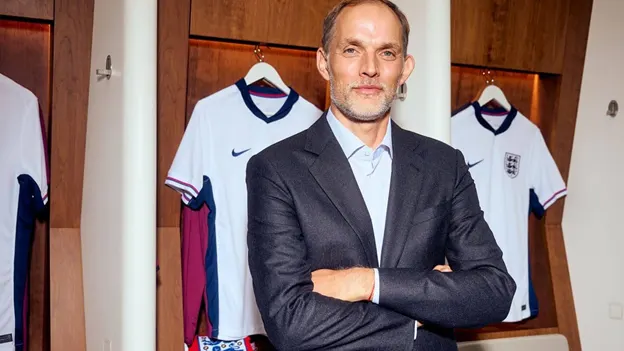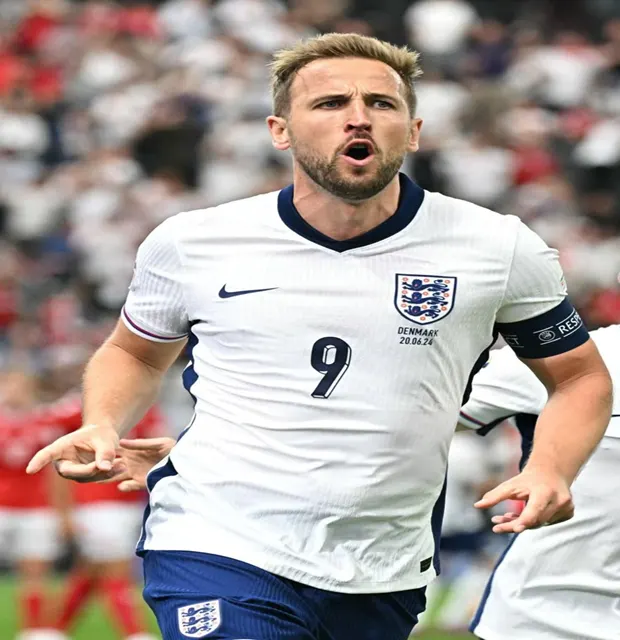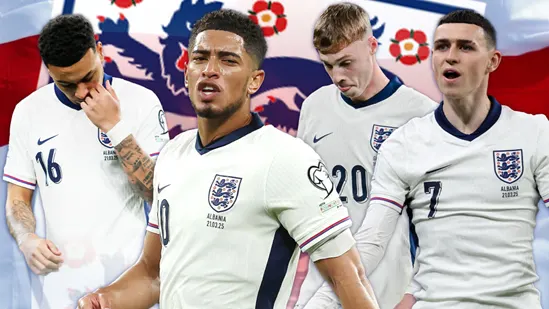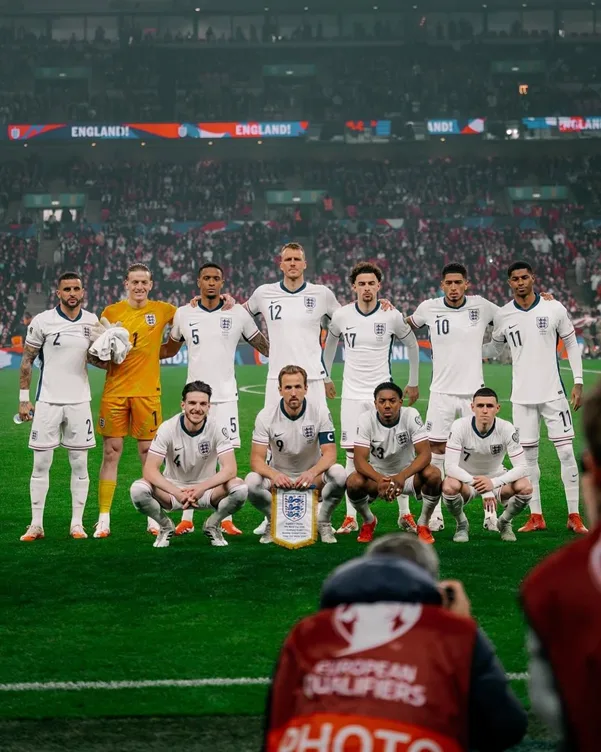Thomas Tuchel, the tactically sharp German appointed in January 2025, has brought fresh intensity to the Three Lions after Gareth Southgate’s pragmatic but trophy-less tenure. England have started strongly under him with five wins from five in World Cup qualifiers without conceding a goal, with only a 3-1 friendly loss to Senegal marring the record.
Tuchel’s England plays with Premier League flair: high pressing, quick transitions, vertical attacks, and tactical flexibility. The team looks more dynamic and risk-tolerant than under Southgate, focusing on off-ball runs, wide overloads, and exploiting spaces behind defences.
Still, limited camp time with just six senior matches by October 2025 means cohesion is a work in progress. Tuchel’s “win-now” mentality, forged at Chelsea (Champions League 2021) and Bayern Munich (Bundesliga 2023), makes England genuine contenders to end 60 years of hurt, provided they adapt quickly to North America’s heat and diverse opponents.

The focus is on peaking by July 2026, with Tuchel already looking to lock on his 26-Man Squad. Tuchel favours a mix of experience, form, and tactical fit, drawing heavily from the Premier League’s depth. He has debuted uncapped talents like Myles Lewis-Skelly and Dan Burn while recalling fringe players like Marcus Rashford. Injuries and form could shift this, but based on recent qualifiers and his preferences (e.g versatile defenders, dynamic midfielders).
FIFA World Cup 2026: England’s Likely Squad:
Goalkeepers (3)
Jordan Pickford (Everton), Dean Henderson (Newcastle), James Trafford (Man City)
Defenders (9)
Kyle Walker (Burnley), Reece James (Chelsea), Trent Alexander-Arnold (Real Madrid), Myles Lewis-Skelly (Arsenal), Levi Colwill (Chelsea), Marc Guehi (Crystal Palace), Ezri Konsa (Aston Villa), Jarrad Branthwaite (Everton), John Stones (Man City)
Midfielders (8)
Declan Rice (Arsenal), Jude Bellingham (Real Madrid), Kobbie Mainoo (Man Utd), Curtis Jones (Liverpool), Adam Wharton (Crystal Palace), Elliot Anderson (Newcastle), Jordan Henderson (Brentford) Phil Foden (Man City)
Forwards (6)
Harry Kane (Bayern Munich), Bukayo Saka (Arsenal), Cole Palmer (Chelsea), Anthony Gordon (Newcastle), Noni Madueke (Arsenal), Ollie Watkins (Aston Villa)

What to expect tactically from Tuchel’s England Team?
Tuchel’s Attacking Blueprint: Tuchel is building his attack around youthful energy. Lewis-Skelly and Anderson inject fresh creativity and depth, while Jordan Henderson’s recall adds much-needed experience and leadership. Meanwhile, Marcus Rashford and Jack Grealish face a crucial fight to reclaim their spots, with their futures hinging on a sharp return to form.
Formation
Tuchel acts as a tactical chameleon, but his England side has settled into a fluid 4-2-3-1 as the base formation, the same shape he favoured at Bayern and Dortmund. Depending on the match situation, the system shifts into a 4-1-4-1 for greater midfield control or even a 3-4-2-1 for added flexibility.
Build-up Play
The double pivot forms the foundation. Declan Rice anchors midfield, while Jude Bellingham makes box-crashing runs. Full-backs like Reece James or Lewis-Skelly invert into central areas, creating overloads and giving England extra control in possession.
Attacking Shape
The wingers, Bukayo Saka and Anthony Gordon, stretch the pitch with crosses and incisive cuts inside. Dual No. 10s such as Cole Palmer and Phil Foden exploit the half-spaces, while Harry Kane drops deep to use his playmaking skills before bursting forward into goal-scoring positions.
Defensive Tactics
Tuchel’s defensive setup focuses on intensity and flexibility:
- High pressing: England applies aggressive pressure high up the pitch to win possession quickly and spark immediate attacks.
- Flexible formations: The team adapts between 4-2-3-1 and 4-1-2-3, depending on the opponent.
- Compact defense: A high line keeps the team solid while limiting counterattacking threats.
- Defensive midfield shield: Two midfielders provide consistent cover, giving attackers more freedom.
- Wing-backs in transition: Full-backs and wing-backs offer width in possession but also recover quickly to support the backline.
Overall Philosophy
Tuchel builds his England side around possession control, rapid transitions, and dynamic movement. The goal is to stretch defenses, overload spaces, and create constant attacking threats while maintaining balance at the back

Probable Game Changers:
Attacking Talents:
- Cole Palmer (Chelsea): Although not in the current squad, Palmer’s skills would be valuable. Assuming he’s fit, his pace and creativity could add depth.
- Harry Kane (Bayern Munich): A prolific goal-scorer with already hitting the ground running in this season one can expect England’s prolific No. 9 to continue his incredible run of form
Defensive Strengths:
- Myles Lewis-Skelly (Arsenal): The 18-year-old left-back sensation brings dynamism with overlapping runs and composure, showcasing his talent with a debut goal vs. Albania.
- Declan Rice (Arsenal): Rice is the metronome of England’s midfield, enabling Tuchel’s press with his passing range (90% accuracy) and aerial dominance.
- Reece James (Chelsea): A versatile defender who can play right-back or center-back, known exceptional attacking prowess and defensive solidity.
Other Key Players:
- Marcus Rashford (Barcelona): Rashford’s pace and finishing ability make him a threat on the counter.
Jude Bellingham’s Supporting Cast: Adam Wharton and Jordan Henderson anchor the midfield with poise and experience, while Kobbie Mainoo and Conor Gallagher inject energy and ball-winning grit. This blend of youth and leadership allows Bellingham the freedom to drive play forward, link with attackers, and dictate England’s tempo in crucial moments.
England’s Strengths and Weaknesses Ahead of the 2026 World Cup
Strengths
- Elite Attack:
England enters the World Cup with world-class attacking firepower. Harry Kane leads the line with ruthless finishing, topping the qualifiers’ scoring charts. Bukayo Saka and Cole Palmer add creativity and flair, while Anthony Gordon stretches defences with blistering pace. Tuchel’s system encourages midfielders to make vertical runs, producing goals from deep, which is exemplified by Declan Rice’s assist against Latvia. England’s high press consistently wins possession high up the pitch, fueling quick transitions, as seen in their dominant 5–0 win over Serbia. - Midfield Depth:
Tuchel’s midfield combines depth, versatility, and balance. Jude Bellingham and Rice form a commanding pivot, excelling in duels and ball progression. Adam Wharton and Kobbie Mainoo offer reliable rotation options, ensuring energy and creativity. The manager’s box-midfield structure opens spaces for advanced playmakers like Palmer to dictate tempo and unlock defences. - Defensive Solidity:
England’s defence has shown impressive consistency. Marc Guehi and Levi Colwill have forged a dependable partnership, while Kyle Walker provides leadership and composure. Inverted full-backs like Reece James enhance ball control and transition stability. A string of clean sheets in qualifying underscores Tuchel’s disciplined defensive organisation. - Tactical Flexibility:
A proven winner, Tuchel thrives on tactical adaptability. Throughout his career, he has employed 17 different formations across his career.
Weaknesses
- Over-Reliance on Kane:
England’s attack still depends heavily on Harry Kane, who will be 33 at the tournament. When he drops deep, attacking channels narrow and creativity stalls. The team continues to struggle against deep defensive blocks, as seen in laboured performances against Albania and Latvia which highlighted the need for more fluidity and invention in tight spaces. - Inexperienced Midfield Core:
While talented, England’s double pivot lacks top-level experience. Henderson, recalled at 35 for leadership, no longer offers the same mobility, and the midfield’s cohesion remains untested against elite opposition. Senegal’s ability to exploit gaps in previous encounters exposed this weakness. - Positional Instability:
Left-back remains a problem area. Luke Shaw and Ben Chilwell are injury-prone, while Lewis-Skelly is still developing. Defensive depth could weaken further if John Stones faces fitness issues. England also shows occasional vulnerability to counterattacks, especially in open play against quick, direct sides
Overall
Tuchel’s England delivers a high-octane evolution, blending tactical adaptability, Premier League intensity, and deep squad options. If the team harnesses its talent effectively, it stands poised for glory. With qualifiers nearly complete, friendlies and the World Cup group stage will put them to the real test. Bringing the trophy home? That goal is closer than ever.


